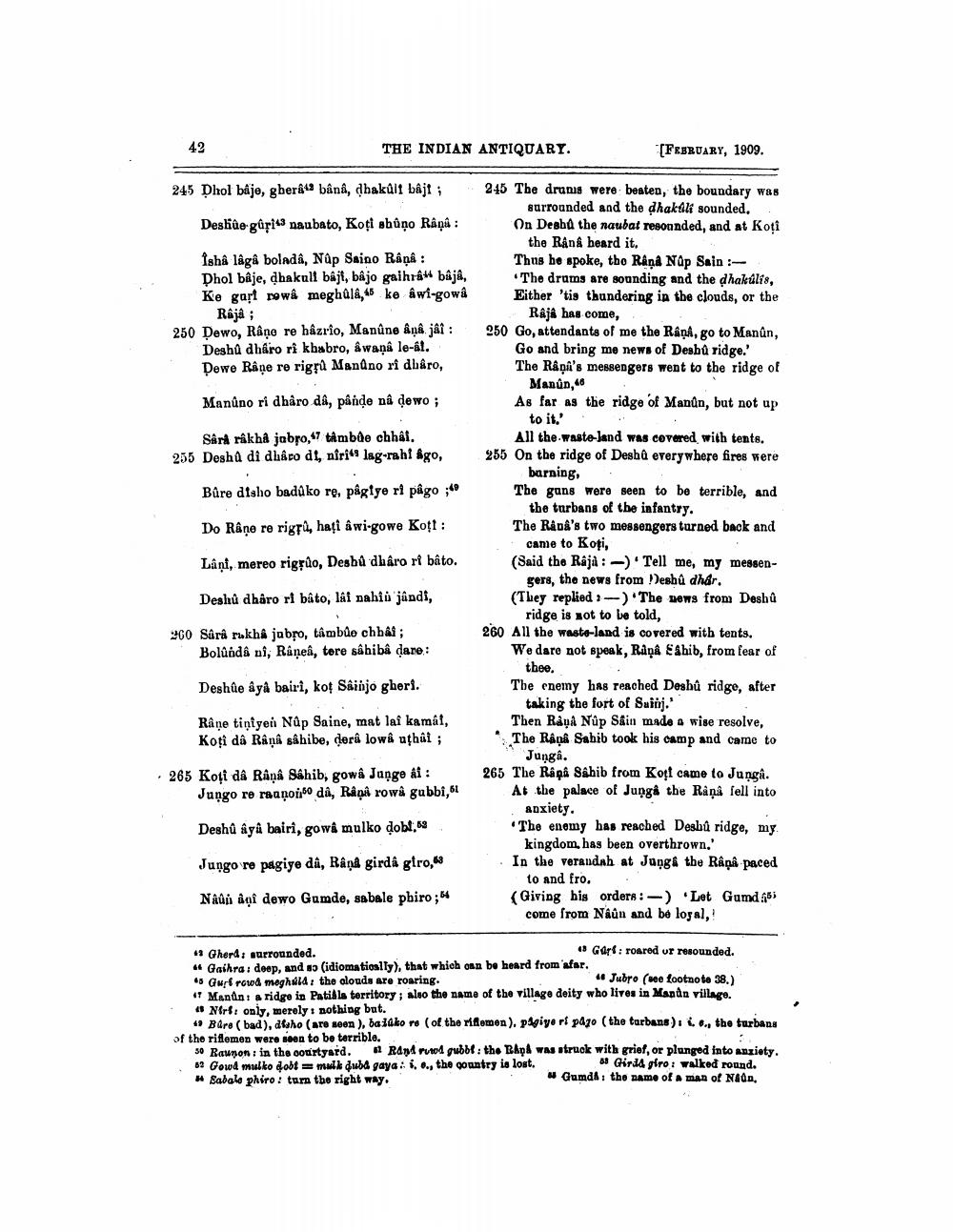________________
42
THE INDIAN ANTIQUARY.
FEBRUARY, 1909.
245 Dhol bæje, gberat bând, dhakült bâjt;
Deskûe gůři^3 naubato, Koți shuņo Raņå :
Isha lågå bolada, Nûp Saino Rânâ : Dhol bêje, dhakull bájt, bâjo gaihra baja, Ke gart rowâ meghQ14,45 ke awi-gowa
Râjâ ; 250 Dewo, Râņo re hâzrio, Manûne &ņâjâi :
Deshủ dharo ri khabro, & wanâ le-al. Dewe Râne re rigru Manno ri dbero,
Manuno ri dhâro da, pânde na dewo;
Sâri rakha jabro,7 tâmbâe chhai. 255 Deshù di dhéro dt, niri lag-raht go,
Bare disho badako re, pågiye ri pågo;
Do Râne re rigri, hați a wi-gowe Kott:
245 The drunis were beaten, the boundary was
surrounded and the dhakali sounded, On Desha the naubat resounded, and at Koți
the Raná heard it. Thus be spoke, tho Raņa Nup Sain :
The drums are sounding and the dhakulis, Either 'tis thundering in the clouds, or the
Râjâ has come, 250 Go, attendants of me the Raņi, go to Manûn,
Go and bring me news of Desbû ridge. The Rapi's messengers went to the ridge of
Manûn, 48 As far as the ridge of Manun, but not up
to it.'
All the waste land was covered with tents. 255 On the ridge of Desbû everywhere fires were
barning, The gans were seen to be terrible, and
the turbans of the infantry. The Rapa's two messengers turned back and + came to Koti, (Said the Raja :-) Tell me, my messen
gers, the news from !eshu dhar. (They replied :-).The news from Deshů
ridge is not to be told, 260 All the waste-land is covered with tents.
We dare not speak, Raņa Edhib, from fear of
thee. . The enemy has reached Deshû ridge, after
taking the fort of Sain.' Then Raya Nûp Skin made a wise resolve, "The Rana Sahib took his camp and came to
Junga. 265 The Rapa Sahib from Koçt came to Junga.
At the palace of Jungå the Raņa fell into
anxiety. The enemy has reached Deshû ridge, my
kingdom, has been overthrown,' In the verandah at Jaņgå the Râşâ paced
to and fro. (Giving his orders :-) Let Gumd 651
come from Naún and be local,
Lani, mereo riguo, Deshů dharo ri bâto.
Deshủ dhäro ri bâto, lai nahi jandi,
200 Sûrâ rukha jabro, tâmbûo chbai;
Bolündâ ni, Raņeî, tere sahibâ dane:
Deshủe åyå bairi, kot Sainjo gheri.
Rane tiniyen Nup Saine, mat lai kamal, Koţi da Râņa sâhibe, dera lowa uthûi ;
• 265 Koți da Rana Sahib, gowa Junge ki:
Jungo re raaņouko da, Raņa rowå gubbi,61
Deshu aya bairi, gowâ mulko dobl.62
Jungo re pagige dî, Raņa girdâ gtro,as
Nadu ani dewo Gumde, sabale pbiro ; 64
1 Gherl: surrounded.
Garf: roared ur resounded. + Gaihra: deep, and so (idiomatioslly), that which on be heard from afar. 5 Gurf rowd meghåld: the clouds are roaring.
** Jubro (see footnote 38.) ++ Mandni a ridge in Patials territory; also the name of the village deity who lives in Mann village. # Nérf: only, merely nothing but.
49 Bare (bad), dlho (are seen ), balako ro (of the riflemen). pipiyerl pago (the tarbans) ... the turbans of the riflemen were seen to be terrible. 50 Rawnon in the courtyard. Randruto gubbl: the Ehpa was struck with grief, or plunged into anziety.
ull du 69 Gowd mulko dobt mulk qubd gaya : 1. ., the country is lost. amaie, the country is lost.
8 Ghirde giro: walked round. # Sabato phiro: tor the right way.
w Gumda: the name of a man of Nada,




